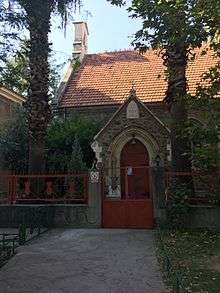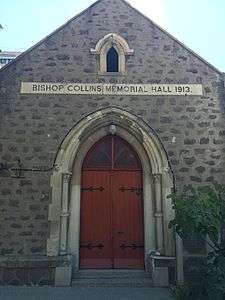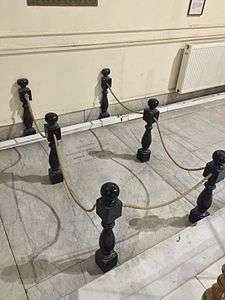St. John Evangelist Anglican Church
St. John Evangelist Anglican Church is an active Anglican church in Alsancak, İzmir, Turkey. It was built about 1625 by the Levant Company.

Architecture
The church was built in a neo-gothic architectural style. The architect of the church is unknown.

Exterior
The exterior design is also neo-gothic. On the west façade, there is a little rose window. Also on that façade there is a spire. Under the rose window, there are three stained-glass windows, behind iron barriers. On the north façade there are small flying buttresses.
Stained-Glass Windows
The back (west) window was made in Germany in 1895. The front (east) window was made in 1904 by Charles Kempe and includes a small panel showing Ignatius of Antioch on his way to martyrdom, being greeted in Smyrna by St. Polycarp, bishop of Smyrna, who kisses the martyr's chains.
Interior

Inside of the church, the grave of William Edward Collins, Bishop of Gibraltar is on the left of the entrance, to the west. There is a baptismal font next to the grave, in the shape of a seashell, an ancient symbol of Christian pilgrimage. Behind that is the rose window. At the other end of the church, faced by the pews, is the altar, below three of the stained-glass windows.
Surroundings
There are 2 more buildings on the site. A second church building, built for the use of British inhabitants and forming part of the premises of the British Consulate General was consecrated in 1843, and named in honour of St. John the Evangelist.
The Bishop Collins Memorial Hall was erected in 1913 and is used as a multi-purpose facility. The Sunday School meets in the hall and the hall and kitchen are used every Sunday for after service fellowship and tea time, as well as for various meetings and events. The church office is next to the fellowship hall. A vicarage was built next to the church in 1911 and is now leased to the British Government for use as the Consulate.
Gallery
 Bishop Collins Memorial Hall
Bishop Collins Memorial Hall The grave of William Edward Collins, Bishop of Gibraltar
The grave of William Edward Collins, Bishop of Gibraltar One of the stained glass windows in the church
One of the stained glass windows in the church A view of the church pulpit
A view of the church pulpit The baptismal font, in the shape of a seashell
The baptismal font, in the shape of a seashell The altar, beneath stained glass windows
The altar, beneath stained glass windows